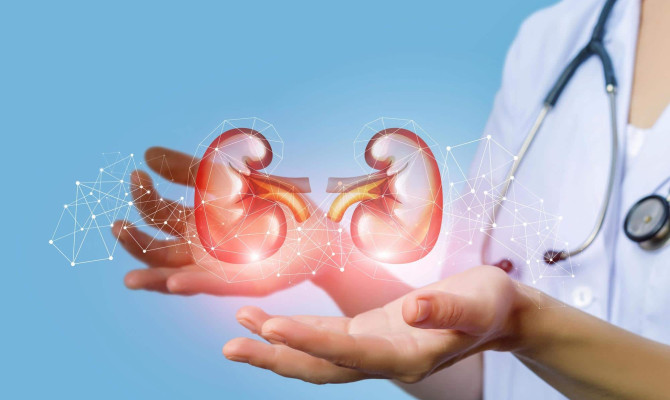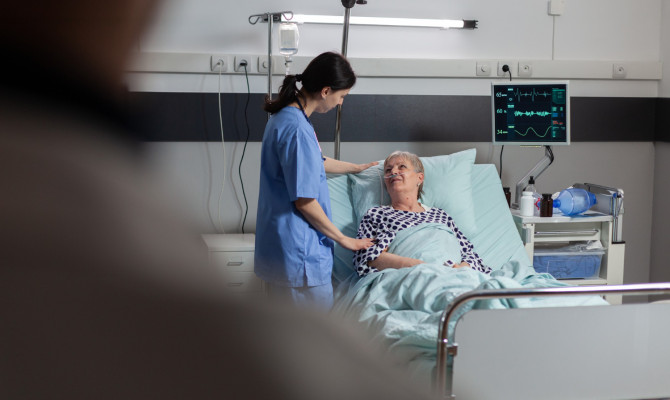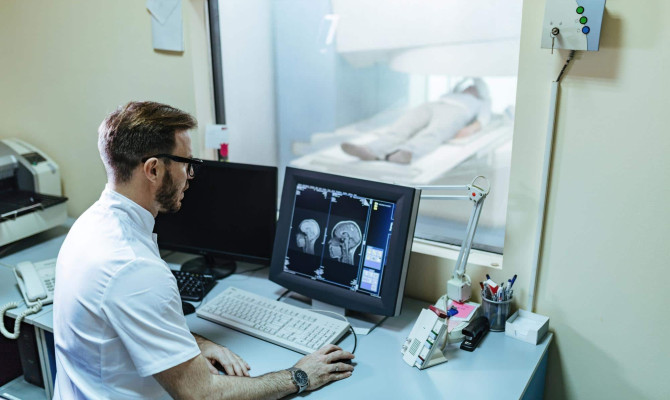Diarrhea : Symptoms, Complications, and Management

- Diarrhea
- 14 Aug 2023
Overview
What is Diarrhea ?
Diarrhea is the medical term for when an individual passes watery or loose stool. It typically lasts two to three days. Many individuals experience diarrhea more than once a year. When someone has diarrhea, they might need to use the toilet urgently more often than usual. They might also feel bloated, experience lower abdominal cramps, and occasionally feel sick. Diarrhea can range in severity from a minor condition to one that could be deadly. Infections with bacteria, viruses, and parasites are the most common causes.

Types
Types of Diarrhea
Based on how long it lasts, diarrhea can of two types:
- Acute diarrhea – is the most prevalent type and lasts less than 14 days. No need for treatment because it usually disappears in a few days. It may be due to an infection.
- Chronic or persistent diarrhea – Usually, diarrhea of this kind lasts longer than 14 days. 1Types | Researched based study from Nlm.nih.gov Most commonly caused by malabsorption, inflammatory bowel disease (IBS), and medication side effects.
Symptoms
Symptoms of Diarrhea
The most common symptoms may include the following
- Loose or watery stools.
- Urgent need to rush to the toilet.
- Loss of control over bowel movement. 2Symptoms | Researched based study from Niddk.nih.gov
- Lower abdominal cramps.
- Bloated belly.
- Nausea.
People with severe diarrhea may show the following symptoms
- Fever and chills.
- Severe pain.
- Weight loss.
- Vomiting.
- Dizziness.
- Excess thirst.
- Exhaustion.
- Dry mouth.
- Sunken eyes.
- Less or dark urine.
- Blood in stool.
- The skin does not immediately flatten after being pinched and released.2Symptoms | Researched based study from Niddk.nih.gov
Causes
Causes of Diarrhea
Diarrhea may result from the following factors
- Viral infections – Rotavirus and Norovirus have the potential to induce diarrhea. The most prevalent cause of diarrhea is viral gastroenteritis, also known as intestinal flu. 3Causes | Researched based study from Nlm.nih.gov
- Bacterial infections – Escherichia coli (the most common cause), Campylobacter (the most common in children), Salmonella, Clostridium, and Yersinia spp. 4Causes | Researched based study from Nlm.nih.gov
- Parasitic infections – caused by Entamoeba histolytica, Giardia lamblia, and Cryptosporidium enteritis.
- Food-borne illnesses – infections that spread by ingesting contaminated foods or beverages.
- Food allergies and intolerances – may include sensitivity to certain foods, lactose intolerance (to milk or milk products), fructose intolerance (to fruit drinks and honey), etc.
- Traveler’s diarrhea – Most likely to occur in people traveling to developing nations.
- Medication side effects – Antibiotics, antacids that contain magnesium, and drugs used to treat cancer are among the medications that can induce diarrhea. 4Causes | Researched based study from Nlm.nih.gov
- Digestive system issues – include functional gastrointestinal (GI) diseases like small intestinal bacterial overgrowth and ulcerative colitis, as well as Celiac disease, irritable bowel syndrome, and others. 3Causes | Researched based study from Nlm.nih.gov
- Abdominal surgery – may cause persistent diarrhea. Any surgical procedure on the stomach, gallbladder, liver, pancreas, small intestine, spleen, appendix, large intestine, or gall bladder is abdominal surgery.
- Radiation treatment may also cause diarrhea.
Prevention
Preventing Diarrhea
The actions listed below may prevent diarrhea by infections:
- After going to the toilet, wash your hands with water and soap. 5Prevention | Researched based study from Nlm.nih.gov
- Before handling or preparing food or eating, wash your hands with water and soap. 5Prevention | Researched based study from Nlm.nih.gov
- Get vaccinations – Rotavirus vaccines can help prevent diarrhea due to one of the causes. Usually given to infants in their first year.
- Store food properly – keep food stored at the proper temperatures, avoid eating items that have gone bad, and handle all foods carefully to prevent food-borne diarrhea.
- When traveling, being cautious about what a person consumes may help.
- Avoid drinking public water, unpasteurized milk, dairy products, or juice.
- Exercise caution when attempting local cuisine from street vendors, consuming undercooked or raw meat or seafood, and ingesting uncooked fruits and vegetables.
- Carry bottled water, and when in question, sip bottled water or hot beverages like tea or coffee.
Complication
Complications associated with Diarrhea
Even though most instances of diarrhea resolve automatically, life-threatening complications can rarely result from it.
- Dehydration – If untreated, it causes severe health problems.
- Electrolyte imbalance – due to a loss of minerals like sodium, potassium, and magnesium.
- Metabolic acidosis – results from bicarbonate depletion.
- Hypovolemic shock – requires IV fluids. 6Complications | Researched based study from Nlm.nih.gov
- Kidney failure.
- Convulsions.
- In babies and children, nappy rash close to the anus.
- Malnutrition due to malabsorption – occurs when there is persistent diarrhea.
Diagnosis
Diagnosis of Diarrhea
The doctor will inquire about the patient’s symptoms, the medications taken, and the medical history, followed by a physical exam and a few tests:
Physical examination
- Looking for signs of fever or dehydration.
- Checking the heartbeat and blood pressure.
- Listening to abdominal sounds.
- Tapping the abdomen to check for pain.
- Performing a digital rectal exam – for blood in the feces.
Laboratory tests
- Stool test – can detect blood, bacteria, parasites, or symptoms of illnesses and disorders.
- Blood tests – determine the severity of diarrhea and any infections. These tests include complete blood counts, electrolyte measurements, and kidney function checks.
- Breath test for hydrogen – can assist the physician in determining whether the patient has lactose sensitivity. After consuming a beverage that contains lactose, if the patient exhales excessive amounts of hydrogen, they are not absorbing and digesting lactose properly.
- Fasting tests – to see if diarrhea reacts to a change in diet, the doctor may advise the patient to avoid foods containing lactose, carbs, wheat, or other ingredients.
Imaging tests
- Upper endoscopy – to identify the source of diarrhea by examining the interior of the stomach and upper small intestine.
- Colonoscopy or flexible sigmoidoscopy – While the complete colon can show during a colonoscopy, a flexible sigmoidoscopy only shows the lower colon. 7Diagnosis | Researched based study from Niddk.nih.gov
Management
Management of Diarrhea
Most diarrhea cases resolve in a few days with home remedies without medical intervention.
Home remedies
In mild instances of diarrhea, the home remedies mentioned below may help:
Avoid Dehydration
To avoid dehydration and loss of electrolytes during diarrhea
- Consume plenty of fluids, including water and electrolyte-balanced beverages like broths, diluted fruit juices, and sports beverages.
- Steer clear of caffeine and alcohol because they may cause dehydration. Additionally, caffeine may have a mild laxative impact that aggravates diarrhea.
- Avoid gassy food and drink like Brussels sprouts, beans, cabbage, carbonated drinks, and beer.
Diet
- Introduce low-fiber, semi-solid foods slowly as the bowel movements feel normal again.
- Try the BRAT diet, which includes bananas, rice, apple sauce, and toast.
- For a few days, avoid dairy products, spicy food, fatty food, and high-fiber foods.
Medicines
- Over-the-counter anti-diarrheal medications – like loperamide 8Management | Researched based study from Nlm.nih.gov and bismuth subsalicylate, may help decrease the frequency and severity of diarrhea.
- Avoid using these medications in kids.
- Always consult a doctor before use any OTC drug.
Consume probiotics
- Probiotics used to increase the beneficial bacteria in the intestine and attain a healthy equilibrium. Obtained as drinks, capsules, and some types of yogurts.
Medical intervention
The following medications or other treatments might be recommended by the doctor if a patient has attempted home remedies for diarrhea without success:
- Fluid replacement – The doctor may suggest having IV fluids if consuming liquids disturb the stomach or cause vomiting.
- Antibiotics – may be used to address bacterial diarrhea. 9Management | Researched based study from Clevelandclinic.org Not helpful in diarrhea due to viruses.
- Modifying medications, if necessary – if the doctor finds that an antibiotic triggered diarrhea, they may reduce the dosage or swap the medicine.
- Treat the root cause – The doctor will work to control the underlying condition to manage diarrhea. Examples: Inflammatory bowel disease (IBS), Crohn’s disease, etc.
- Supplementing with probiotics – can help people feel better by reducing the duration and severity of their symptoms. 10Management | Researched based study from Nlm.nih.gov
Takeaway
Key Takeaways
- Even though diarrhea remains common, it can still be life-threatening if it leads to electrolyte loss and dehydration.
- The most vulnerable groups to dehydration due to diarrhea are infants, small children, and older adults. Take lots of liquids with electrolytes as it enables the body to replenish the electrolytes and fluids depleted due to diarrhea.
- If diarrhea does not clear up, one should consult a doctor immediately.
Any feedback on this article?
 This Articles content was accurate
This Articles content was accurate Very Informative Article
Very Informative Article I have a question or a comment
I have a question or a comment
 This article contains inaccurate content
This article contains inaccurate content This article was not helpful
This article was not helpful I have a question or a comment
I have a question or a comment
We appreciate your helpful feedback!
Checkout our social pages
References
-
National Library of Medicine
Chronic Diarrhea | Types
-
National Institute of Diabetes and Digestive and Kidney Diseases
Symptoms & Causes of Diarrhea | Symptoms
-
National Library of Medicine
Viral Gastroenteritis | Causes
-
National Library of Medicine
Bacterial Diarrhea | Causes
-
National Library of Medicine
Effects of water quality, sanitation, handwashing, and nutritional interventions on diarrhoea and child growth in rural Kenya: a cluster-randomised controlled trial
-
National Library of Medicine
Hypovolemic Shock | Complications
-
National Institute of Diabetes and Digestive and Kidney Diseases
Flexible Sigmoidoscopy-Diagnostic tests | Diagnosis
-
National Library of Medicine
Loperamide | Management
-
Cleveland Clinic
Diarrhea | Management
-
National Library of Medicine
Diarrhea | Management





































